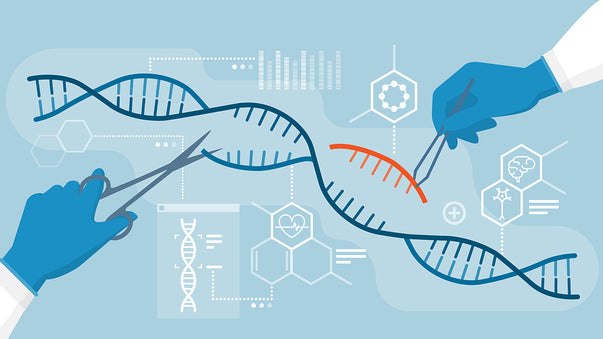Interfacing DNA to Silicon for Data Storage

Scientists have stored data in the genomes of living bacteria, Nature reports. Researchers at Columbia University designed bacteria “that, when zapped with electricity, make distinctive changes to their genomes. The ‘electricity on’ and ‘electricity off’ genomic patterns serve as the equivalent of the 1s and 0s used in digital computers.”
A research paper is published in Nature Chemical Biology. It describes a new “electrogenetic” framework for direct storage of digital data in living cells. The scientists encoded binary data in 3-bit units into CRISPR arrays of bacterial cells by electrical stimulation. To demonstrate the new technology, the scientists electrically encoded up to 72 bits of data and wrote the message, “Hello world!”
“Imagine having cellular hard-drives that can compute and physically reconfigure in real time,” research leader Harris Wang told Singularity Hub. “We feel that the first step is to be able to directly encode binary data into cells, without having to do in vitro DNA synthesis.”
This has evident applications to data storage. This “may give James Bond a new tool for hiding messages in plain sight,” notes a summary published in Science. But perhaps this research program will have even more spectacular applications in life sciences and medicine.
Creating a direct interface between silicon and genomes “could significantly accelerate our ability to reprogram cells for our own devices,” notes Singularity Hub. “If you can get the cells to directly talk to a computer, and interface its DNA-based memory system with a silicon-based memory system, then there are lots of possibilities in the future,” Wang said.
Disabling a Single Gene May Slow Aging
A genome-wide CRISPR-based screening technology has identified a new driver of cellular aging. This was reported in a press release issued by the Chinese Academy of Science. They added that this could form part of new strategies to delay aging and prevent aging-associated diseases.
A research paper is published in Science Translational Medicine. It shows that disabling a gene called KAT7 by CRISPR can reduce cellular aging and senility. KAT7 is one of the catalysts for aging. The gene therapy is based on disabling a single gene or using KAT7 inhibitors.
According to the researchers, this could extend mammal life. It could also slow down the aging of human liver cells and find applications in medicine against human aging.
Nanoparticles for Vaccines Against Coronaviruses
Caltech scientists are using nanoparticles to develop vaccines for a wide range of related coronaviruses. Their aim is to prevent future pandemics.
The scientists have designed a protein-based nanoparticle onto which pieces of up to eight different types of coronavirus have been attached. The nanoparticle is shaped like a cage made up of 60 identical proteins. Each has a small protein tag that functions like a piece of Velcro.
A research paper is published in Science. It reports that, when injected into mice, this nanoparticle induces the production of antibodies that react to a variety of different coronaviruses. They include similar viruses that were not presented on the nanoparticle.
Only a Few Proteins Control Many Cancer Types
By analyzing data from almost 10,000 patients, Columbia University researchers have found that tumors can be categorized into 112 subtypes. This is regardless of the cancer's origin. Within each subtype, “Master Regulator” proteins that control the cancer were virtually identical, independent of the specific genetic mutations of each patient.
A paper is published in Cell. It indicates that the key genetic programs necessary for the survival of cancer cells are mechanistically controlled by only 24 Master Regulator modules. Each comprises just a handful of such proteins working in concert.
The researchers are persuaded that this has the potential to streamline and improve cancer treatment in the future.
More Articles
Don't miss a beat! In our Pulse Newsletter, Thrivous curates the most important news on health science and human enhancement, so you can stay informed without wasting time on hype and trivia. It's part of the free Thrivous newsletter. Subscribe now to receive email about human enhancement, nootropics, and geroprotectors, as well as company news and deals.
Read more articles at Thrivous, the human enhancement company. You can browse recent articles in Thrivous Views. See other Pulse Newsletter articles. Or check out an article below.
-
CRISPR May Revolutionize World Health
Two patients have been cured of beta thalassemia and sickle cell disease, after their own genes were edited with CRISPR-Cas9 ...
-
This Supplement Combo May Decrease Aging Effect of Stress
In 2016, researchers from the University of Padova in Italy published a study in the journal Nutrients. It demonstrated that ...


